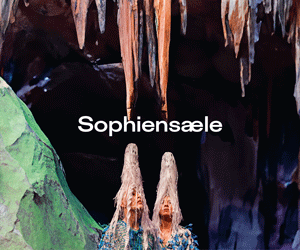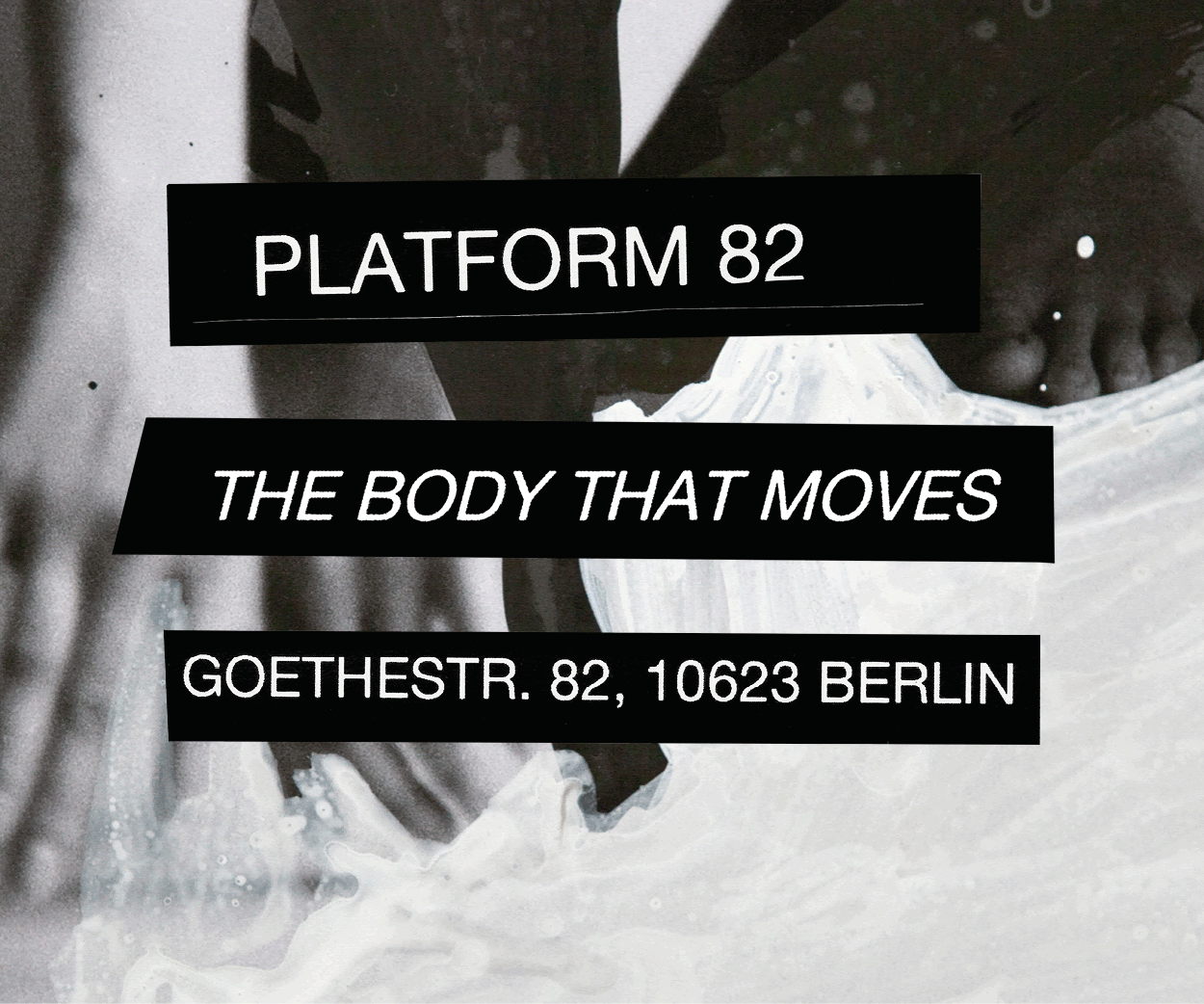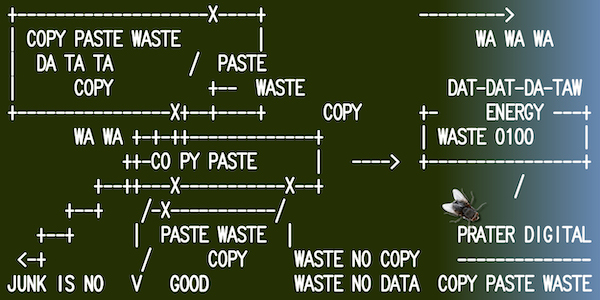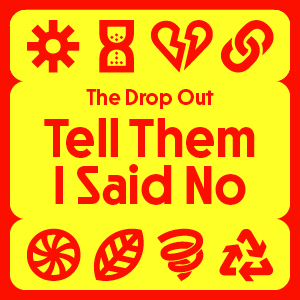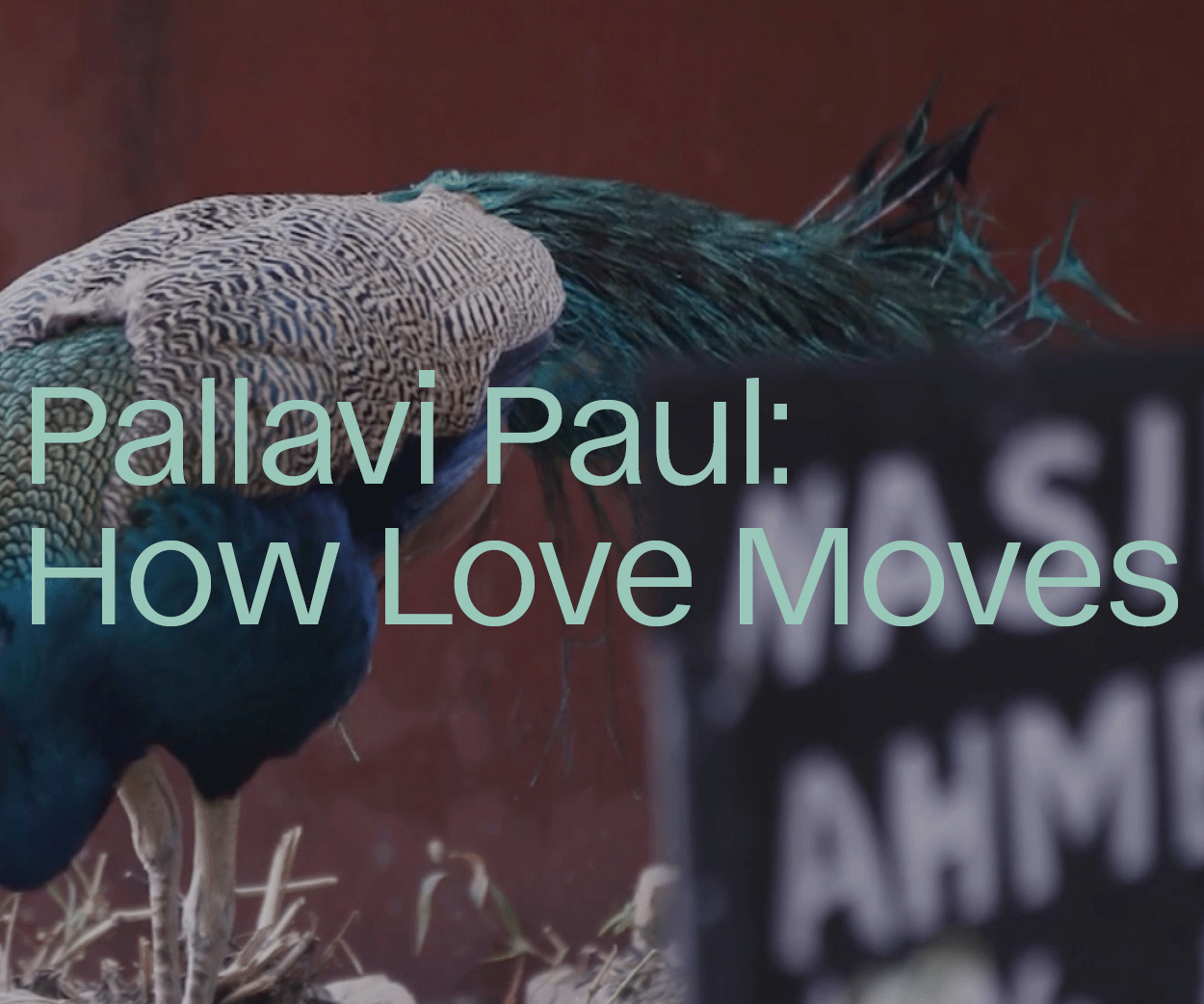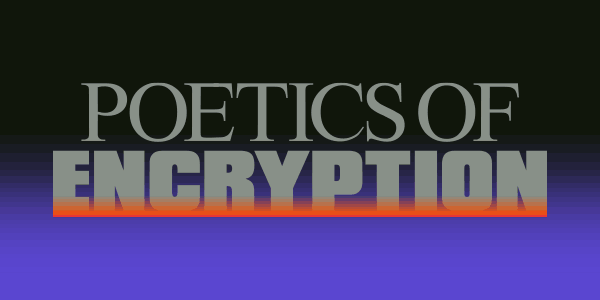by Alison Hugill // Jan. 26, 2024
The title of Berlin-based duo Elmgreen & Dragset’s current exhibition at Kunsthalle Praha—‘READ’—is both a worthy suggestion and, in its contemporary pop cultural usage, a kind of benign threat: to “read” someone means, essentially, to roast them. When RuPaul declares on his Drag Race that the “library is open” he sets the scene for contestants to ridicule each other, to “read one another to filth” (scan for flaws). In other similar understandings of the word, like “read the room” or “read the signs,” we’re implored to uncover something deeper, not to simply judge a book by its cover.
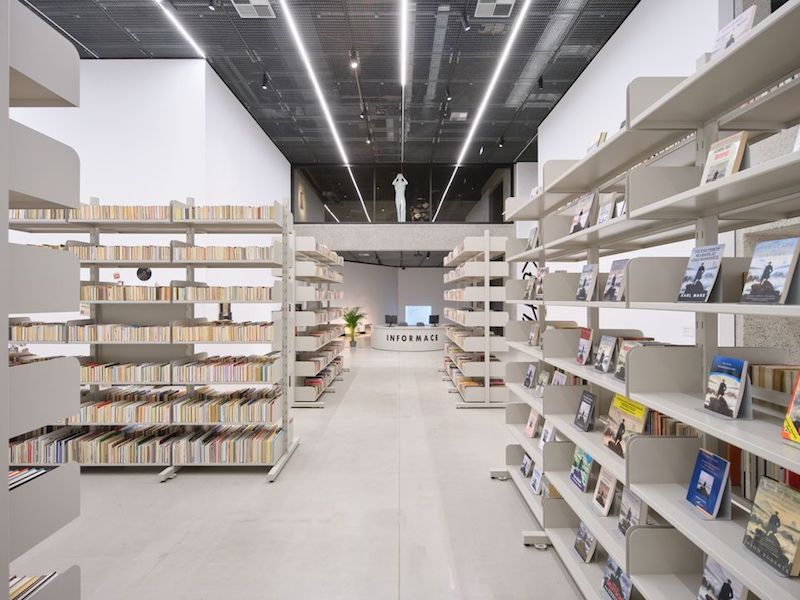
Elmgreen & Dragset: ‘READ,’ 2023, installation view, Gallery 1 // Copyright Elmgreen & Dragset, courtesy of Kunsthalle Praha, photo by Vojtech Veskrna
With this backdrop of references in mind, the exhibition sheds its simple aesthetic allusion to an everyday public library and encourages visitors to uncover more playful riddles and insidious indictments throughout. Elmgreen & Dragset have invited more than 60 artists to contribute to the show, with some works selected from within the Kunsthalle Praha’s collection. The contributions are embedded within a scenography that is reminiscent of municipal libraries the world over: the grey, double-sided metal shelving they use is a staple of any such institution. And Prague, in particular, has a long literary heritage, with the Czech Republic among the countries with the highest per capita number of public libraries.
Looking over the makeshift library from the entrance above, we immediately recognize that the books’ spines (where one would normally read their titles) are facing down, a choice that highlights the book’s materiality over its content. The paper inside, in its varying stages of yellowing, speaks to the book’s use-value and draws our attention to the function of the library as an aesthetic space, rather than immediately revealing any kind of ideological inclination inherent in the artists’ selection of books. Each shelf is labeled with a somewhat unusual category (ie. “childhood”) and accompanied by a fitting artistic intervention, either a work by Elmgreen & Dragset or one of the participating artists.
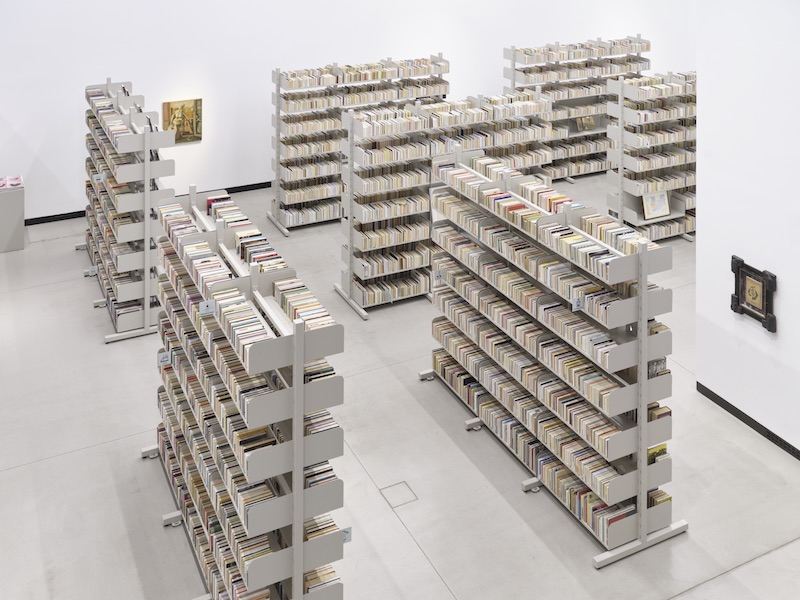
Elmgreen & Dragset: ‘READ,’ 2023, installation view, Gallery 1 // Copyright Elmgreen & Dragset, courtesy of Kunsthalle Praha, photo by Vojtech Veskrna
Walking past the true-to-life but unmanned information desk and finding ourselves in amongst the books, we discover that there are some exceptions to the spine-down rule: one shelf contains dozens of books and publications featuring Caspar David Friedrich’s famous 1818 painting ‘Wanderer Above the Sea of Fog’ on their covers. The significance of this painting—which is commonly used as a visual stand-in for the concept of the “sublime”—is not didactically unpacked here, but its repetitive recurrence hammers home a sense that certain images reign in terms of mass “readability” in western cultures. Across the room and in dialogue with this collection, a site-specific piece by Saâdane Afif, entitled ‘Above the Sea of Fog (The Lost Peaks)’ (2023), consists of a small display of Czech books on the subject of mountaineering, arranged to resemble a mini mountain ridge, and placed at the highest point of the exhibition, where no one can reach them.
Another shelf nearby presents a series of carefully-curated titles, deemed by the artists to be the most “interesting” books sourced from the hundreds loaned by libraries, bookstores and the French Institute in Prague. Discovering the red thread among these titles would require multiple visits, and even then might be futile: what piques the interest of the artists is, after all, subjective. The reason why Czech translations of Virginie Despentes’ ‘Vernon Subutex’ and Étienne Balibar’s ‘Violence and Civility’ meet in this shelf’s display might merely be a coincidence of their common original language, or could hold some deeper political meaning. Regardless, the act of only showcasing one shelf of books in this way privileges their worth and prompts more questions than the exhibition seeks to definitively answer, as more rooms and artistic interventions await.
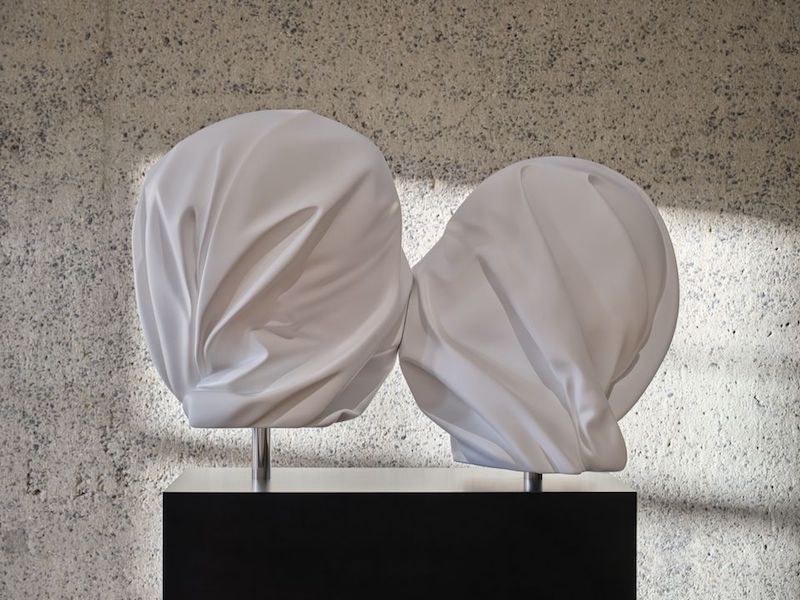
Elmgreen & Dragset: ‘Other Lovers,’ 2018 // Courtesy of the artist, photo by Vojtech Veskrna
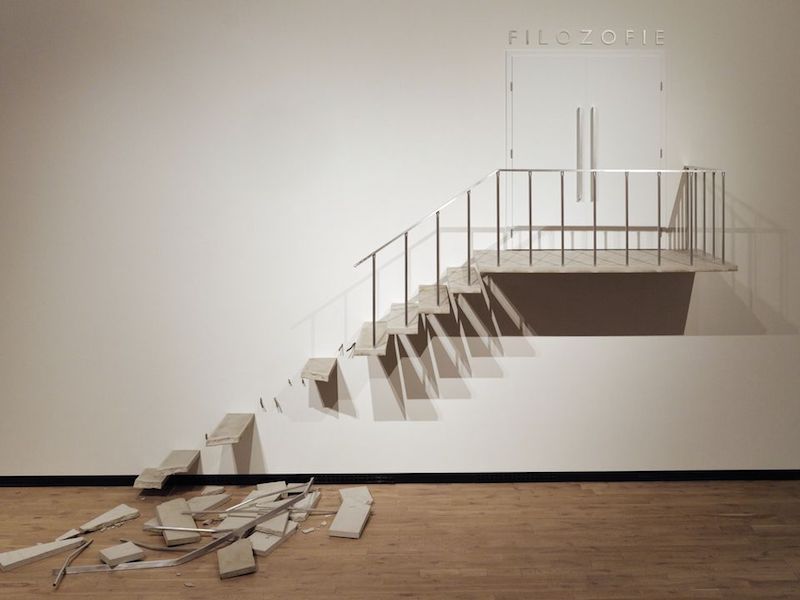
Elmgreen & Dragset: ‘READ,’ 2023, installation view, Gallery 1 // Copyright Elmgreen & Dragset, courtesy of Kunsthalle Praha, photo by Vojtech Veskrna
In the upper gallery space, some of Elmgreen & Dragset’s more well-known pieces are displayed next to site-specific installations and guest interventions. The duo’s evocative sculptural work ‘Other Lovers’ (2018) sits on a black pedestal next to a wall showcasing the 50 most banned books in the US, many of which concern critical race theory or queer themes. Opposite that wall, a broken and unusable stairway leads to an impossibly high door that reads “Philosophy,” a nod to the discipline’s characteristic inaccessibility. At the window, a sculpture of a small child, Elmgreen & Dragset’s ‘I’ (2023), appears to be writing something—a cry for help or a first attempt at literacy—on the glass pane using only his finger and the fog of his breath. Another nearby installation by Simon Fujiwara is indicative of the exhibition’s overall sense of humour: the ‘Fifty Shades Archive’ is a collection of copies of the erotic novel ‘Fifty Shades of Grey,’ sourced from the charity Oxfam, which, in 2016, received so many copies of the book that they launched a social media campaign to discourage people from donating it. Upon learning about the campaign against these unwanted and also unrecyclable books, Fujiwara began acquiring copies, including the entire inventory of Oxfam, to create his archive.
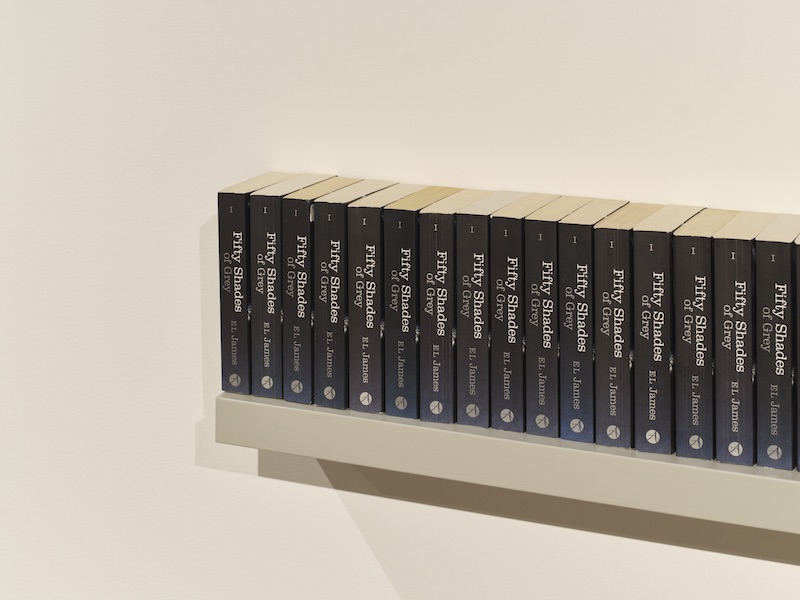
Simon Fujiwara: ‘Fifty Shades Archive,’ 2017–ongoing // Copyright Simon Fujiwara, courtesy of Kunsthalle Praha, photo by Vojtech Veskrna
While the exhibition focuses on the importance of the physical book as a living artefact and the library as a community meeting place, it also acknowledges the widespread takeover of the digital realm, as well as the threat of extinction of different forms of legibility over time. Aleksandra Domanović’s ‘Grobari’ (2009) is one of her “paper stack” works, a sculptural object made up of printed PDFs stacked vertically. In this case, the PDFs are pages from the .yu domain, which expired in March 2010, long after the dissolution of the Yugoslavian state. The physical display of web pages underscores the absurdity living in the past, while also warning against the impermanence of current forms of online engagement.
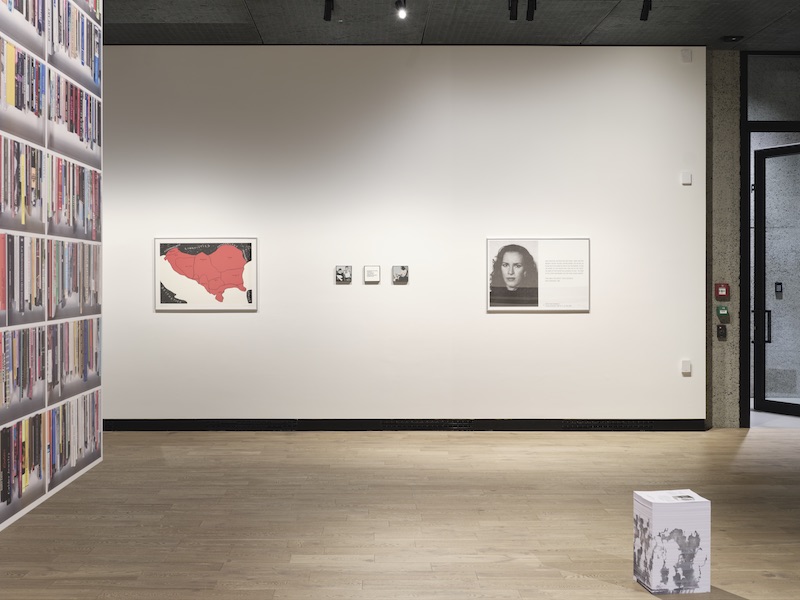
Elmgreen & Dragset: ‘READ,’ 2023, installation view, Gallery 2 // Copyright Elmgreen & Dragset, courtesy of Kunsthalle Praha, photo by Vojtech Veskrna
These are only some of the examples among the hundreds of works presented in ‘READ.’ It’s an exhibition that, in order to be fully deciphered, demands different forms of literacy and multiple understandings of the verb “read.” But—much like a library itself—it also offers more universal entry points, accessed via Elmgreen & Dragset’s characteristically witty approach.
Exhibition Info
Kunsthalle Praha
Elmgreen & Dragset: ‘READ’
Exhibition: Nov. 16, 2023–Apr. 22, 2024
kunsthallepraha.org
Klárov 5, Malá Strana 118 00, 1 Praha 1, Czechia, click here for map


